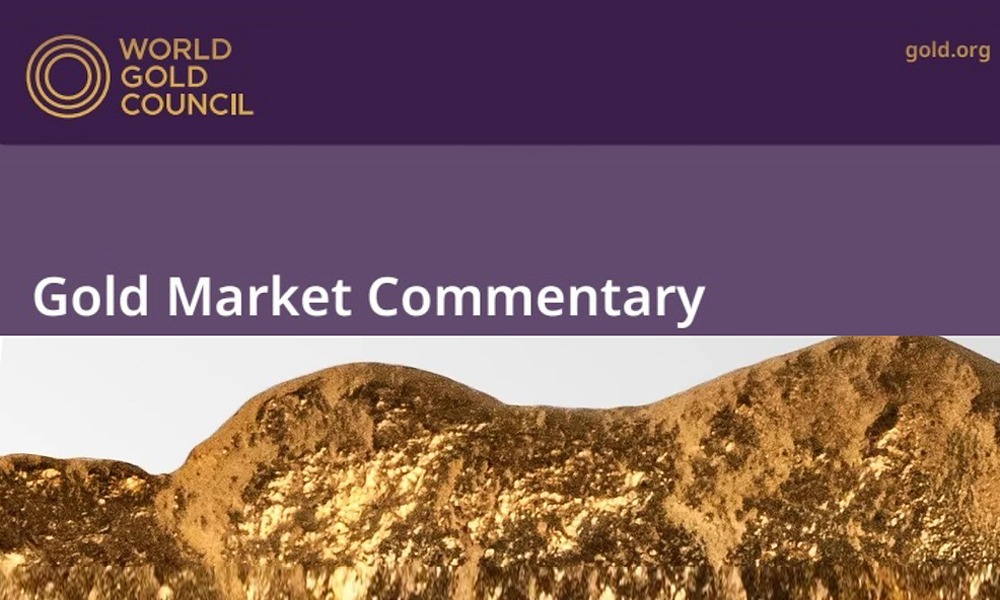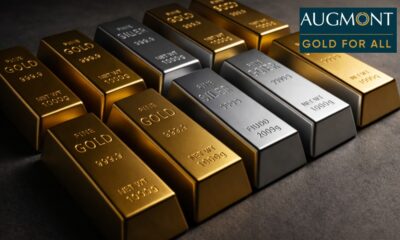International News
WGC Gold Market Commentary: Strong euro and tariff fears drive gold

Another month, another set of new highs. Gold finished March 2025 at US$3,115/oz, a gain of 9.9% m/m.Even a materially weaker US dollar, primarily via euro strength, couldn’t prevent a stellar performance and new highs across all other major currencies .
According to our Gold Return Attribution Model (GRAM), euro strength and thus US dollar weakness was once again a key driver of gold’s performance, alongside an increase in geopolitical risk capturing tariff fears. Gold ETF buying continued apace in March with all regions contributing. US funds led the charge with US$6bn (67t) of net inflows followed by Europe then Asia with approximately US$1bn each. While ETF flows were positive, COMEX futures declined marginally by US$400mn (5t) likely on profit taking.
March review
A stronger euro, tariff fears and ETF buying edged gold to new highs once again in March.
Looking forward
Fiscal and monetary support may be receding, and the timing isn’t great for risk assets given current turmoil. Fundamentals remain solid for gold.
• Liquidity matters, and has arguably been bolstering both financial assets and the economy in the US for much of the post-COVID period
• In 2022, however, US financial conditions tightened forcefully as liquidity was removed from markets. This perfect storm caused a very rare annual joint decline in bonds and equities. Gold held up but also experienced some bumps along the way
• We are now at a similar impasse in liquidity conditions, but with crucial differences that bode well fundamentally for gold
• The one hurdle is the hitherto strong run-up in gold prices. Comparisons to the 2011 and 2020 peaks are likely to be made, but in our view, the environment remains supportive of further gains.
While by no means the sole contributors to their solid performance, the US economy and financial markets benefited from monetary and fiscal support since the COVID pandemic.
activity). Gold also succumbed, falling 20% over two quarters
in 2022, before a recovery to end the year flat. Proving direct causality is difficult, yet it does suggest markets and the economy had grown accustomed to artificial support.
At a crossroads
While much of the conversation over the past week has centred around tariffs, liquidity risk remains an important undercurrent. And we believe we may now be approaching a similar impasse to what markets experienced in 2022.
Quantitative tightening is slowing but there has been no mention of a resumption of quantitative easing. Indeed, the appetite might not be there given the high levels of debt and sticky inflation. In addition, constraints on government spending via the Department of Government Efficiency (DOGE) are stifling fiscal support. And the Fed’s Overnight Reverse Repo facility (ON RRP) is low, which provides less wiggle room for the Fed to manage liquidity issues. This appears to be showing up in stats like order-book liquidity for equity futures and – as flagged in the Fed’s financial stability report in November– on-the-run bond liquidity. It may also be contributing to the year-to-date equity rout.
And the labour market is flirting with contraction as hours worked are in steep decline. Logically they lead an employment slowdown as companies reduce hours for staff before layoffs; statistically this also appears to be the case. But layoffs are also now on the rise and are likely to feed into payroll numbers in due course (Chart 5). To add to this, uncertainty surrounding tariffs has supercharged concerns about the resiliency of labour markets in the short and medium term.
While inflation was rising more in 2022, it was driven by growth. This time around inflation is sticky while growth is faltering, resulting in a stagflationary environment. In this context, rates are unlikely to be going up from here and further weakening of the dollar is likely on waning US exceptionalism
Central banks have been strong contributors to gold’s performance over the past three years and show few signs of letting up, adding fundamental support to prices
US gold ETF investors had built up sizeable holdings in 2020 prior to the 2022 wobbles. But they have been sidelined until recently, suggesting capacity to keep adding.
Fundamentals remain in place…
The current run-up in price has taken many by surprise. Paraphrasing an old adage, shouldn’t high prices for a commodity cure high prices? Gold is not a commodity in the traditional sense and primary production’s response may have only limited impact on price. The willingness to hold and reluctance to sell – given current extreme policy uncertainty – could generate real momentum. By historical standards, the current rally isn’t particularly large or long. And comparing the current rally to the recent 2011 and 2020 peaks highlights that, relatively speaking, fundamentals look more solid (Table 2):
• US gold ETFs are a considerably smaller share of all US ETF assets than during 2011 as ETF buyers have been on the sidelines for the best part of four years they are not overbought
• Real yields are higher and above their long-run average, suggesting more downside than upside risk for yields – and vice versa for gold prices
• Forward equity price-to-earnings remains high, and that provides capacity for further downside to equities should an economic slowdown and earnings downgrades worsen, especially in the current geoeconomic conditions, a boon for gold’s safe-haven appeal
• Credit spreads are considerably tighter than during the two previous peaks. Again, widening risks trump contraction risk, and are also gold supportive.
• The dollar remains elevated relative to prior periods even if it has weakened since the start of the year. With the Trump administration favouring a weaker dollar and the uncertain effect of tariffs, this could serve as an additional tailwind for gold.
…But not without risks
But we also caution that there are risks for the gold price after a rally such as this in such a short space of time.
Treasury managers at central banks could prudently slow their pace of buying given the price rally, as we saw with some central banks last year. While consumer demand adapts to higher prices eventually, the speed of price moves is like to dampen net buying in the near term. A liquidity crunch could negatively affect gold as the most liquid assets are sold to meet margin calls.
Additionally, geopolitical and policy nervousness is quite elevated, particularly given significant uncertainty about tariffs and its effect on market volatility, which is likely adding a meaningful premium to gold prices. Any resolution could bring that premium out as we have seen in previous historical periods.
In sum…
The extent and speed of gold’s rally has drawn out comparisons to previous peaks. While there are headwinds that the gold market will naturally face in this environment, our analysis also suggest that current macroeconomic conditions are quite different to prior periods when the gold market reached previous highs.
DiamondBuzz
De Beers Group Launches “Heera Hai Aapke Liye” Program at IIJS Bharat Signature to Revolutionize Natural Diamond Accessibility in India

De Beers Group, the world’s leading diamond company, marked a significant milestone in the Indian jewellery landscape with the official launch of the “Heera Hai Aapke Liye” program at IIJS Signature. The star-studded event featured actress Sonakshi Sinha, who joined Shweta Harit, Global Senior Vice President of De Beers Group and CEO of Forevermark, to unveil an initiative dedicated to making natural diamonds an integral part of daily life for the modern Indian consumer.



The “Heera Hai Aapke Liye” (Diamonds are for You) program is strategically designed to promote natural diamonds by raising awareness, boosting market visibility,and creating a seamless connection between retailers and consumers. With a focus on modern designs and attractive price points, the program also lets local retailers use De Beers Group campaigns as their own—second-piercing earrings, ‘Bestie’ bracelets, and ‘Intention’ pendants. It positions diamonds as a lifestyle choice for self-expression and daily wear.

Speaking at the launch, Shweta Harit, Global Senior Vice President of De Beers Group and CEO of Forevermark, detailed the evolution of the brand’s storytelling, stating, “De Beers Group has a rich legacy of creating iconic ritual campaigns that have shaped how the world perceives diamonds. With ‘Heera Hai Aapke Liye,’ program we are evolving that narrative for the Indian market to another level.
We are not just selling jewellery, we are making natural diamonds more accessible and desirable in India. Our goal is to empower retailers through INDRA (Indian Natural Diamond Retailer Alliance) to ensure that every ‘First Diamond’ journey is as credible as it is beautiful.”

Speaking on the occasion, Kirit Bhansali, Chairman, Gem & Jewellery Export Promotion Council (GJEPC), said, “IIJS has always been a powerful platform for shaping the future of India’s gem and jewellery industry, and the launch of ‘Heera Hai Aapke Liye’ at IIJS Signature reinforces that role. GJEPC is proud to partner with De Beers Group on the INDRA (Indian Natural Diamond Retailer Alliance) project, which is a critical step towards strengthening domestic demand for natural diamonds.
By empowering retailers, enhancing consumer confidence, and expanding access across metros and Tier 2 markets, this initiative aligns perfectly with our vision to grow the natural diamond category sustainably within India.”
The program ‘Heera Hai Aapke Liye’, rests on few strategic pillars aimed at industry growth and scalability:
- Stocking & New Consumer Opportunity: Identifying gold wholesalers and distributors across 15–20 cities to focus on a first-phase target of 500 retailers.
- Retailer Advantage: Providing a “Design Advantage” and strict “Product Hygiene,” backed by a clear buy-back policy and robust training and marketing support via the INDRA alliance.
- Heera Hai Aapke Liye is robust entry-level product kit featuring earrings, bangles, bracelets, etc supported by exclusive visual merchandising (VM) for display.
- Growth and Scalability: A PAN-India reach strategy designed to unlock new business opportunities for both manufacturers and retailers.


As India continues to grow as the world’s second-largest market for retail diamond jewellery, De Beers Group remains committed to strengthening the natural diamond narrative. By combining the emotional appeal of natural diamonds with the practical “Heera Hai Aapke Liye” framework, De Beers aims to build a sustainable future for the category across both metros and Tier 2 cities. De Beers and GJEPC aim to expand the base of Natural Diamond buyers, increase self-purchase consideration, and establish long-term credibility for the category.
-

 New Premises6 hours ago
New Premises6 hours agoChow Tai Fook Goes Global: Iconic Jeweler Debuts in Bangkok with Eyes on the West
-

 ShowBuzz8 hours ago
ShowBuzz8 hours agoExperience A New Era of Diamond Jewellery at the revamped DP Jewellers Ujjain & Udaipur Branch
-

 National News7 hours ago
National News7 hours agoiAMORY Goes Mobile: D2C Jeweler Debuts App to Disrupt India’s ‘Counter-Led’ Retail
-

 National News10 hours ago
National News10 hours agoKISNA Diamond & Gold Jewellery launches KISNA Digital Gold in partnership with SafeGold, expanding its omnichannel gold ecosystem









